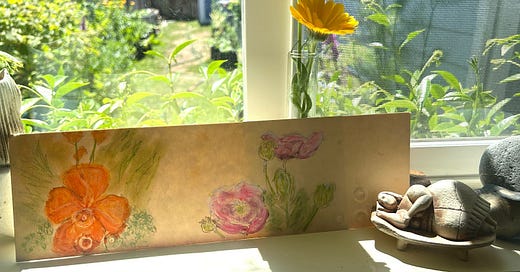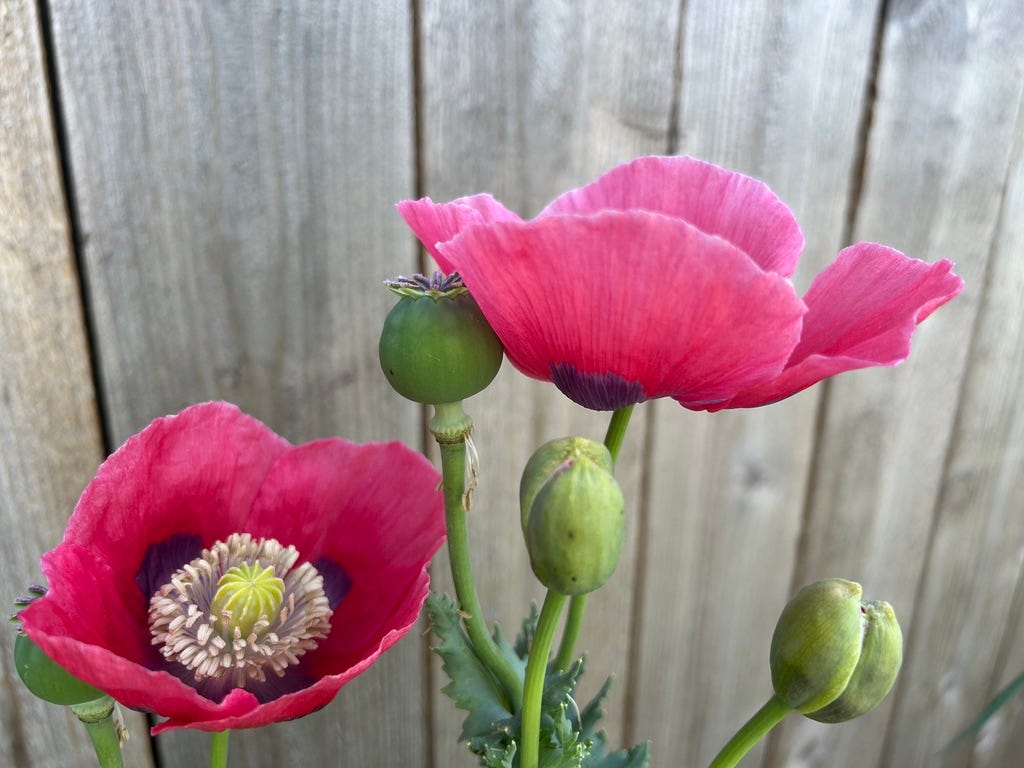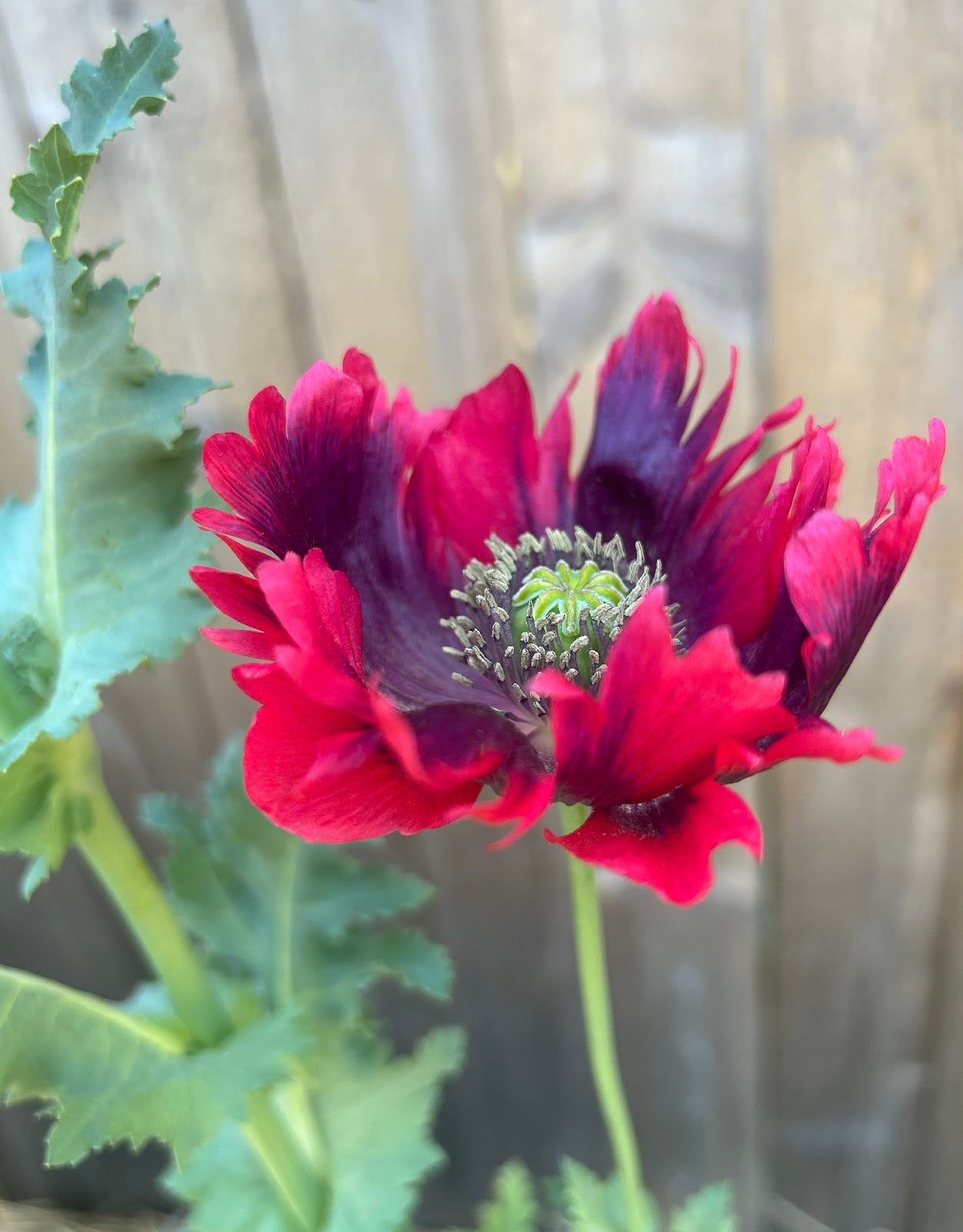This Week in Joyful Practice: Cross-Pollination
lessons from the garden for building a healthy creative ecosystem
Last night, Jenn sent me a picture of an index card. On the card she’ drawn a watercolor sketch of a foxglove. On top of the sketch, she typed ideas for a Joyful Practice principle we’d been playing with earlier in the day about the collective unconscious and collaboration:
Cross-pollination
mind meld
microchimeras
are signs of a healthy creative ecosystem.
This morning, while watering the garden, I took pictures of the poppies–poppies that have popped up in all kinds of unexpected places. I generally let them grow where they want, which means this year, the poppies are hanging out with the scarlet runner beans and some have even found their way along the edges of the bed where mustard and collard greens are growing. The bright orange California poppies stick to themselves, but the larger Oriental poppies cross-pollinate like crazy, which means they're resilient as hell, and I never know what color combos will turn up. This year, some have papery pink petals with smooth edges and dark purple centers, while others are a darker pink, their purple centers bleeding towards the edges of their fringed petals.
I’ve started to think about gardening as an experiment in sharing space. I’m collaborating with the birds and the wind and the squirrels. Last year a handful of tulips showed up in the bed where I’d decided to grow beets, so I let them stay until they died back. The beets seemed happy enough to share space with them. I expect the squirrels will likely dig up the tulips from their new home in a pot next to the foxgloves that appeared next to the garden shed a couple years ago. So it goes.
My space-sharing experiment got challenging last week when the birds pulled up all of the baby green bean seedlings and left them to die on top of the soil that once held their roots. But this is also how it goes. I got mad and then I got over it because I couldn’t blame the birds for their curiosity and hunger. And then I remembered that last year the birds did the same thing in the same garden bed—I replanted an entire row of runner beans and covered it with bird netting until each plant was strong enough to hold its own. Maybe next year I’ll remember to use the bird netting the first time I plant seeds in that bed.
Cross-pollination creates diversity, and diversity creates resilience, reciprocity, and so much abundance. Bees share the pollen from poppy to poppy. Birds eat the currants growing in our garden and become tiny seed scattering vehicles, dropping seed-filled poop across fields and gardens. Squirrels forget where they’ve buried their winter stashes and tulips pop up!
[I’m reminded of Robin Wall Kimmerer’s lovely essay in Emergence Magazine on abundance and reciprocity .]
This joyful practice experiment Jenn and I started back in February is a constant source of surprise, inspiration, and exhilaration. Jenn and I are like two cross-pollinating poppies, taking on the textures and colors of each other’s creative impulses and turning them into something new but connected. My creative life is enriched because of the generosity and reciprocity of our collaboration.
Witnessing Jenn follow her creative impulse to watercolor and doodle, to illustrate the daily moments that call to her, reminded me that I can play with colors and images the same way I play with words. I’ve felt intimidated by drawing because I don’t think of myself as an artist, but I am one. I’m an artist the same way my seven-year-old niece is an artist–it's there waiting for all of us, that deep source of playfulness and creative experimentation.
Jenn’s watercolor sketches also reminded me of something I tell my students all the time–focus on the process not the product. This idea can feel cliche, I know, but it's an important part of both joyful practice and creative collaborations. In order to build something new, we have to get lost in the joy of creating it, otherwise, we risk building a structure that lacks flexibility. If we worry too much about the end product, we risk losing out on the expansive possibilities of cross-pollination.
I want my creative ecosystem to be like my garden. I want the world I inhabit to be a world filled with cross-pollination. Collaboration is a form of hope. It is a way to take a thing and create something even more amazing than you ever could have created alone.
prompts
Play with a creative medium that intimidates you or makes you curious (or both!). Rather than thinking about the product that come from your creative experiments, imagine being seven-years-old again. Create for the joy of it. Let your fingers get smudged with oil pastels. Collect found items on a walk and use them to make an altar. Cut up an old calendar and collage until your fingers are sticky with glue. Try cooking something just for your own pleasure.
Share creative space with a friend. Jenn and I have a plan to spend time together every Friday this summer in joyful practice. I’m thinking of it like two toddlers in parallel play. Sharing a space, engaging in creative play separately and together, and learning from each other. Who can you play with? What might you do together? Sing? Draw? Act out a scene from a play? Cook? Got to a lake and before you swim, get sticky eating watermelon and make mud pies (okay, that one is for me…anyone wanna join me in this summer fun?!?!)?







